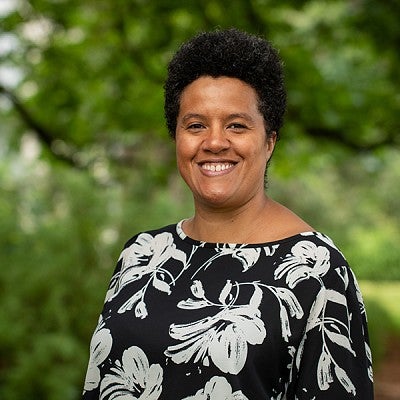
Philosophy
Courses: Critical Reasoning, The Hunger Games and Social Philosophy, Medical Ethics, Ethics, Philosophy and Race, Social and Political Philosophy
In my courses you will:
- Interact during exciting, participatory class meetings.
- Explore new perspectives.
I was invited into the Teaching Academy because:
- I participated in the UO Summer Teaching Institute.
In what ways are you working to make your teaching inclusive?
I take pride in developing syllabi that put standard or canonical philosophical texts in conversation with more recent interventions from feminists, critical philosophers of race, and other figures whose perspectives challenge both that canon and my students’ own assumptions about how the world works. I have, for example, taught feminist critiques of traditional ethics, racial critiques of social contract theory, the need for consideration of social context in bioethical debates, and the interventions of women and people of color as a key feature of contemporary philosophy. Far from distracting from standard philosophical issues, these interventions help to illuminate the standard issues and show their relevance to our everyday lives.
What do you do in terms of professional engagement with the teaching and learning culture on campus or nationally?
I participated in the Difference, Inequality, and Agency pathway at the 2018 UO Summer Teaching Institute. I have attended conference sessions on accessibility issues in higher education. I have also been trained in group-based cooperative learning techniques.
In what ways was your teaching in this course research-led—informed by research on how students learn and inflected by UO's research mission?
My teaching interests and approaches are deeply connected to my research interests and my professional service commitments. Though philosophy is a rich and fascinating field full of powerful intellectual tools for criticizing the social and political status quo and for crafting new pluralist visions of justice and emancipation, the discipline finds itself with a poor record of inclusion with respect to racial, ethnic and gender minorities. I am committed to increasing the diversity of both the discipline itself and its areas of concern, and to showing students of all backgrounds the transformative potential of philosophical work. I also take very seriously and try to learn from research on how students succeed and grow. On that basis, I work to minimize lecture in my courses and maximize the time students working through and reflecting on texts and concepts individually or in small groups.
Who or what led you to this discipline?
Or what is the most inspiring or exciting thing about your field of study? Or how does your field of study enrich people’s lives? As a black woman working in Critical Philosophy of Race, I consider myself both a product and an agent of a necessary transformation taking place within the field of philosophy. My own decision to pursue graduate studies in philosophy came in large part from my participation in the Rutgers Summer Institute in Philosophy for Minority Students in 2000. This week-long program, which I attended the summer after earning my BA, introduced me to various areas of philosophical study, allowed me to interact with undergraduates, graduate students and professors working in these areas, and gave me a genuine sense of what graduate school and a subsequent career in philosophy might look like. It also introduced me to the professor who became my dissertation advisor. I am committed to doing all I can to increase the diversity of both the discipline’s members and its areas of concern. I also seek to increase the general sense of philosophy’s relevance to the lives and experiences of diverse people and populations.
Who had the most influence on you growing up?
My mother was the most influential person in my life. She was fun and loving and devoted to me. She was a wonderful listener, a moral exemplar, and exceptionally brave in a very quiet sort of way. She died in 2010, but lives on in the memories of all those who loved her, in the person and parent that I am today, and in my first book, which she influenced in subtle ways and which is dedicated to her.
